Somalia
Somalia, one of the world’s poorest countries, is confronting a worsening health care crisis following the dismantling of the U.S. Agency for International Development (USAID) earlier this year by the Trump administration. The loss of funding has rippled through communities already struggling with conflict, poverty and fragile public services.
Doctors Without Borders warned in August that widening funding gaps are “undermining health care in Somalia,” noting that the suspension of USAID support had forced the closure of 37 health and nutrition sites in and around Baidoa, roughly 250 kilometers from the capital, Mogadishu.
While bombings and gun attacks by the al-Qaida-linked al-Shabab have declined in recent months—leading some to credit President Hassan Sheikh Mohamud’s “total war” strategy—Somali civic leaders argue that military gains are coming at the expense of essential services.
“A significant amount of the domestic revenue generated by the government goes to the security sector,” said Mahad Wasuge, director of the Somali Public Agenda think tank. “That is quite an indication that security remains the first priority for the government.”
Hospitals Struggling to Stay Afloat
Those working inside Mogadishu’s overstretched public hospitals say foreign assistance remains the backbone of the health system. Banadir Hospital, built with Chinese support in 1977, and De Martino Hospital, established a century ago by Italian colonial authorities, remain the main destinations for patients traveling from distant and often insecure regions.
Even these flagship facilities depend heavily on humanitarian groups. At Banadir, the unit treating severely malnourished children survives entirely on donor funding channeled through Concern Worldwide. The organization supplies milk, food for mothers and babies, and pays the salaries of the remaining 13 staff members—after 37 others lost their jobs due to the U.S. aid cuts.
At De Martino Hospital, director Dr. Abdirahim Omar Amin said nearly all equipment in the medical laboratory was acquired through donor contributions. But he fears the worst as existing contracts with humanitarian organizations begin expiring next year.
“Now it looks like donors are fatigued,” Amin said. “We only have two international NGOs working with the hospital—Population Services International and the International Rescue Committee.”
Most services at De Martino remain free thanks to these groups. Patients with non-urgent conditions are asked to cover some costs, but many cannot afford them. With a diphtheria outbreak spreading in rural areas, the pressure on the hospital has intensified.
Amin hopes the government will eventually step in: “This hospital belongs to the Ministry of Health. I hope, even if the humanitarian groups leave, the Ministry will replace their position.”
Deputy Health Minister Mohamed Hassan Bulaale told the AP that Somalia is working with partners to prepare a “contingency plan” following the loss of USAID support, but did not provide further details.
A System Long in Disrepair
Somalia’s public health crisis is rooted in decades of conflict and institutional collapse. After the fall of dictator Siad Barre in 1991, many public facilities were destroyed or abandoned. De Martino Hospital itself once served as a shelter for displaced people fleeing clan-based warfare.
Today, the federal government—confined to a heavily fortified zone near Mogadishu’s airport—struggles to project authority beyond the capital, even with support from African Union peacekeepers, U.S. airstrikes on al-Shabab, and a host of foreign security partners vying for influence.
Turkey, for example, finances a major hospital with intensive care capabilities in Mogadishu. But even high-profile investments cannot offset the systemic shortfall.
“Even the limited number of public hospitals that have started to function properly lately are heavily dependent on donor money,” Wasuge said. “They don’t get direct government budget that allows them to provide better health care services.”
“No National Health Plan”
For Mohamed Adam Dini, a member of parliament representing Puntland state, the crisis reflects a deeper political failure.
“The health care situation is deteriorating and there’s no national health care plan as we don’t have a national political plan,” Dini said. “These two issues are coinciding and it is unfortunate.”
He added that unchecked disease outbreaks are spreading in the absence of a coordinated national strategy.
Despite the bleak outlook, many Somalis remain reliant on Mogadishu’s few functioning public hospitals. Amina Abdulkadir Mohamed, a jobless mother, recently chose to give birth at De Martino simply because she knew she would not be asked for payment.
“I was told there is free medication,” she said.
With donor fatigue increasing and foreign funding uncertain, the question facing Somalia is not just how to secure its territory—but how to safeguard the health of millions who depend on a system held together by increasingly fragile support.




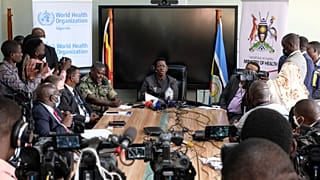
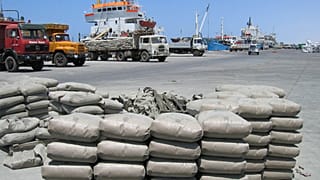
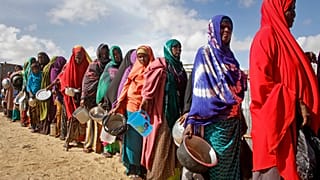
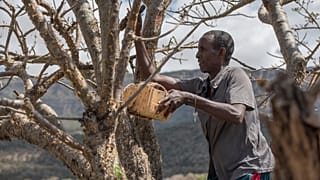
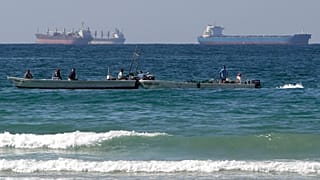


00:57
Tensions escalate as ships attacked in the Strait of Hormuz
01:02
Iran fires back at Israel, U.S. bases after attacks
01:11
South Africa: U.S. aims to process 4,500 refugee applications each month
00:05
'I did not know Jeffrey Epstein,' Hillary Clinton tells congressional committee
01:48
Iran warns US: choose 'table of diplomacy' or face 'firm blow'
01:04
Zimbabwe walks away from $367M US health deal over sovereignty concerns